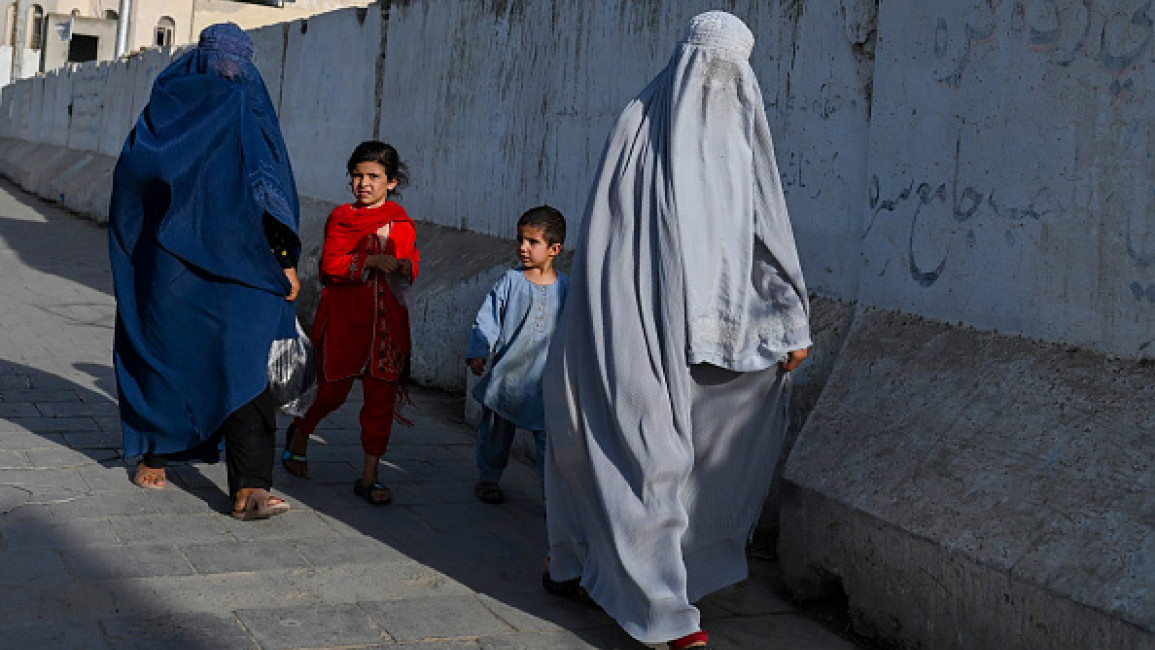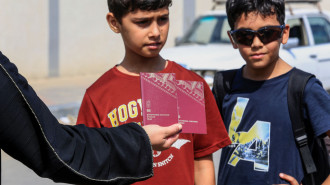Did the Taliban ban women from speaking in public?
Afghanistan's new vice and virtue laws have sparked a major backlash among human rights groups, particularly legislation that reportedly bans women's voices and faces in public,
Last Wednesday, the country's Taliban rulers introduced the first set of 'vice and virtue' laws, which ranged from men having to grow beards to banning drivers from playing music in their vehicles.
Most shockingly, the laws have been interpreted as forcing Afghan women to cover their faces in public and lower their voices when they leave their homes.
It grants the Ministry for the Promotion of Virtue and Prevention of Vice significant powers to oversee the personal conduct of Afghan citizens in public spaces with violators of the new laws facing arrest.
Afghanistan has reiterated its stance that the new laws reflect its interpretation of Islamic law, slamming criticism and concerns as "arrogance".
Since the Taliban resumed control of Afghanistan in 2021, their particular restrictions on women and limitations on freedom of expression have seen a massive backlash from human rights groups and numerous foreign governments.
The New Arab breaks down what exactly these recently announced laws entail and what it means for Afghan women.
Are women prohibited from speaking in public altogether or restricted to certain acts?
The Iranian and Kurdish Women's Rights Organisation (IKWRO), a women's rights organisation based in the UK, told The New Arab that the Taliban laws signify a major reversal of the freedoms and protections Afghan women won before the Taliban returned to power.
Diana Nammi, IKWRO's executive director, said the new laws prohibit women from speaking publicly at forums, gatherings, and even in shops.
Nammi added that women are also explicitly banned from singing in public, especially in front of male audiences, in accordance with the Taliban's strict interpretation of Sharia law, which dictates that a woman's voice should be concealed.
She also said the laws also ban women from speaking publicly in educational settings such as schools.
Although women are generally forbidden from pursuing an education, the Taliban have also closed girls' schools beyond the primary education level and barred women from teaching or attending school.
Women are now largely prohibited from most forms of employment, especially in visible or public roles such as the media, where they once played prominent roles.
"While the laws prohibit women from 'speaking in public' in all forms, the cumulative effect of the restrictions on public speaking, singing, reading aloud, and general participation in public life amounts to prohibit women’s public presence and voice," she continued.
"These restrictions reflect the Taliban's broader agenda of marginalising women from all spheres of public and educational life."
Impact on Afghan women
Nammi has warned that the new laws pose a "profound and devastating impact on the rights and daily lives of Afghan women" and warned the restrictions will halt their personal and professional growth, leading to psychological distress such as depression and suicide.
"Many women, who once contributed to their household's income, are now barred from working. This exacerbates the economic hardship for families and increases poverty levels, amounting to a rise in potential forced and child marriage," she added.
"The long-term effects of these restrictions will likely be felt for generations."
The executive director also warned that not only are girls and women now stripped of their right to education but also barred from participating in Afghan society financially and socially.
Before the implementation of the new morality laws, UNESCO reported in the wake of the three-year anniversary of the Taliban takeover- of Kabul that around 1.4 million girls have been denied any education beyond the age of 12.
UNESCO also confirmed that the decline in education for girls in Afghanistan and a spike in poverty can result in a rise in child labour and early marriage with the country already having some of the world's highest rates of child marriages.
In 2021, UNICEF Executive Director Henrietta Fore highlighted credible reports of families offering daughters as young as 20 days old for future marriage in exchange for a dowry.
IKWRO said that the recent regulations have exacerbated what it considers "gender segregation and gender apartheid system by the Taliban" against Afghanistan’s women and girls.
While the United Nations, rights groups, and foreign governments have since condemned the Taliban’s gender-based limitations, Nammi says that such influence has been blocked by "geopolitical complexities".
The Taliban has made diplomatic inroads recently, including attending UN-hosted talks on Afghanistan in Qatar, and, despite not being recognised by any state, seeing the UAE accept the credentials of the Taliban’s ambassador to Abu Dhabi.
An Emirati official said the decision reflects the government's commitment to contributing to building bridges and supporting the Afghan people, although the UN has previously stated that it is nearly impossible for countries to recognise a Taliban government while restrictions on women and girls remain.
Nammi said that "the Taliban’s legal system provides no recourse for women to challenge these discriminatory laws" and they are unprotected under the new laws, as the "absence of an independent judiciary under the Taliban regime further entrenches these violations" and bars them from legal recourse.
"Under the 2004 Afghan Constitution, which the Taliban has effectively disregarded, there were protections for women’s rights, including the right to education, work, and participation in public life," Nammi continued.
"The Taliban's laws are in direct violation of these constitutional guarantees, although the Taliban does not recognise the current constitution."
Calls to action
Nammi says her organisation firmly calls for a "coordinated, strategic, and action-oriented" international response to effectively address what is deemed as breaches of both Afghanistan’s domestic law and its human rights obligations.
Action could also be taken by launching a case against the Taliban at the International Criminal Court (ICC) for gender-based discrimination, as well as specific penalties against key Taliban leaders and other figures, instead of wider economic sanctions.
"We hope that Gender Apartheid will be considered as a crime internationally. We hope this could increase pressure on the Taliban leadership and signal that their actions have global legal consequences," Nammi asserted.
"Given the severity of the situation, more direct more resources to support Afghan women and girls, including educational programmes, mental health services, and legal aid should be delivered."
Last month, New York Law School professor Penelope Andrews wrote that codifying gender apartheid under international law is crucial for advancing gender equality and dealing with the threat posed to women in Afghanistan.
"I fully support broadening the definition of the crime of apartheid to include gender,” she wrote in a piece for The Conversation. "This is necessary given the persistence and ubiquity of structural discrimination and violence against women worldwide."
Andrews further stated that codifying "gender apartheid" could extend far beyond protecting Afghan women and girls and could provide significant relief to many victims and survivors who currently lack adequate recourse from the international community and states.
"It could also lead to a more effective and concerted international response to gender-based oppression," she added.
On Monday, deputy government spokesman Hamdullah Fitrat stated that the law would be implemented "gently" through advice and guidance.
The Taliban government recently indicated that the morality police would take on a more prominent role in enforcing religious law.
This follows a July UN report, which accused the Taliban's morality police of creating a "climate of fear" in Afghanistan.
The New Arab has approached the Afghan embassy in London for comment.




 Follow the Middle East's top stories in English at The New Arab on Google News
Follow the Middle East's top stories in English at The New Arab on Google News


![The US vetoed a UN Security Council (UNSC) resolution demanding a ceasefire in Gaza [Getty]](/sites/default/files/styles/image_330x185/public/2185152251.jpeg?h=7ef8ac04&itok=RpLSj2pu)